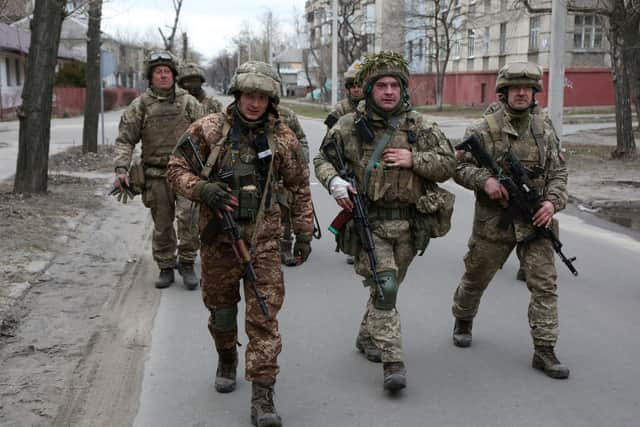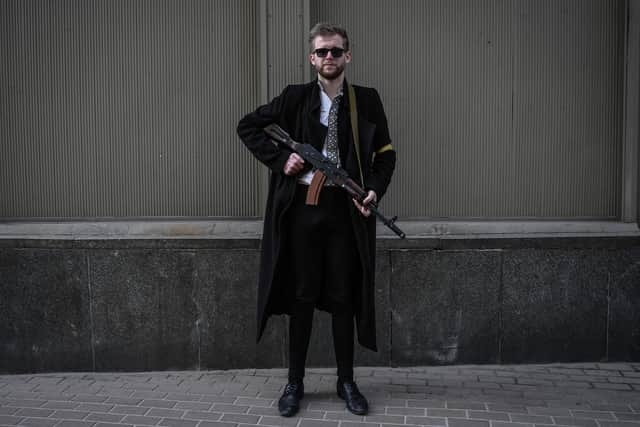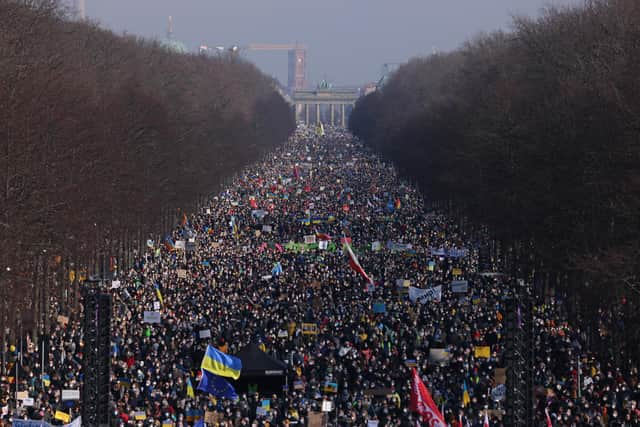Russia invades Ukraine: Vladimir Putin's plan for swift victory has failed as Ukrainians fight to defend their freedom – Dr Tetyana Pavlush
When missiles and shells began raining down at 4am local time on that day, not only were the inhabitants of Kyiv, Kharkiv, Mariupol and Zhytomyr shaken out of their sleep, but Europe and the whole world.
Supposedly, Vladimir Putin’s plan was for a swift victory: ‘beheading’ Ukraine by destroying its government, breaking the resistance of the army, and brutally suppressing local opposition, leading to demoralisation, surrender and the establishment of a puppet state. The success of this “special military operation”, as it is called in Russia, would leave Europe, already frightened and disunited, shocked and concerned but still hesitant to act.
Advertisement
Hide AdAdvertisement
Hide AdJubilant crowds transported from Russia for the purpose would have greeted Russian tanks with flowers and expressed gratitude for being liberated from the hordes of “Banderites” and “Nazis”.
Probably, even a referendum would have been staged within a few days with state-controlled TV channel Russia Today broadcasting images of joyful people queuing at the polling stations, carefully guarded by the “friendly, green men”, and desperately wanting to become one with their “brothers”, the Russians and Belarusians.
A surge of patriotism would have swept through Russian cities and villages. Even those activists and public figures considered to be in opposition to Putin would then recognise his political genius.
Russian academics working in the leading European research centres would courageously declare the operation to be illegal, while at the same time making sure to explain it was unavoidable and irreversible, arguing that the only way for Ukraine to develop and survive was in close partnership with, or rather under the supervision of, its older brother.


Some sanctions would have been expected, of course, from the neighbouring countries on the new western border allowing Europe to save its face.
But the situation on the ground would appear to be “not that simple” and it would be only a matter of time before a return to “business as usual”. This scenario had worked well during the Crimea operation in 2014 and later in Donbass, so why not to use it again?
However, quite the opposite has happened. Ukraine’s well-organised regular army, assisted by the volunteer territorial defence units and local civilians, is holding strong.
Ukraine’s people are showing astonishing courage and unprecedented unity in the face of Russian aggression, despite the tremendous destruction, losses and suffering caused by heavy bombardments.


Advertisement
Hide AdAdvertisement
Hide AdAccording to a nationwide survey, conducted on March 1 by survey group Rating, 88 per cent of the respondents believe that Ukraine will be able to repel Russia’s attack. And this number is increasing daily. Furthermore, 98 per cent of the respondents support the armed forces of Ukraine and 93 per cent approve of President Volodymyr Zelensky’s actions. Political rivalry, criticism and debates have been put aside until peacetime.
Finally, the unparalleled power and unity of the international response, which is still unfolding, has dealt a heavy blow to the aggressor state.
More has been done within one week than during the last eight years. If there had been such a resolute and consolidated response back in 2014, when Russia violated Ukraine’s territorial integrity and sovereignty by occupying Crimea and by instigating the war in Donbass, which has cost Ukraine more than 14,000 lives, the current insult could have been avoided.
The events of the past week have come as a big disappointment to Russia’s elites. Being forced into ‘zugzwang’ – in which any move would make his position worse – Putin embarked upon his ‘Plan B’, acting precisely as he always does: lying, threatening, provoking, killing, escalating, and now even resorting to nuclear terrorism.


For Russia, the reality is that the invasion of Ukraine is an aggressive, imperialist war. For Ukraine, people are fighting an anticolonial, patriotic and people’s war of national liberation. Ukrainians are fighting for their freedom, country and home which is now under direct threat of physical elimination.
“We will seek to demilitarise and de-nazify Ukraine,” stated Putin in an address to Russians, making references to several historical events, including the Russian Revolution, in an attempt to argue that the Ukrainian nation does not exist and, therefore, somehow justify his war.
For “de-nazification” read the complete and definite destruction of Ukraine’s statehood and leaders and the eradication of its national identity, history and cultural heritage.
The Russian air force has been working hard to raze to the ground the historic cities of Kharkiv, the first capital of Ukraine, and Chernihiv, one of the most significant cities of the medieval empire of Kyivan Rus, whose descendants both Ukraine and Russia claim to be.
Advertisement
Hide AdAdvertisement
Hide AdMany archives, libraries, galleries, and museums have been shelled. Three missiles hit the Babi Yar memorial to the Holocaust in Kyiv. Elderly members of the Jewish community who survived the bombing of the city in June 1941 and whose relatives were murdered in September 1941 are now forced to take refuge in a bomb shelter.
“De-militarisation” apparently means barbarous attacks on water and energy supplies, governmental buildings, hospitals, schools, residential areas and nuclear reactors. Ukraine’s emergency services reported that, as of Wednesday, more than 2,000 civilians had been killed and more than a million refugees had fled.
In the meeting of Russia's security council on Thursday, Putin stated that the “operation” in Ukraine was going strictly to plan and that Russian soldiers and officers were acting as real heroes.
It is a most outrageous thing that, in 21st-century Europe, war crimes are being committed, thousands of people are being murdered, and the world is on the brink of nuclear catastrophe. All this for the sake of an imperial myth about a greater Russia, based on a distorted version of history. Russia's path to this tragic moment in world history will need to be studied in the future, if there is one.
Dr Tetyana Pavlush, who is Ukrainian, is a lecturer in modern European history at Cardiff University
A message from the Editor:
Thank you for reading this article. We're more reliant on your support than ever as the shift in consumer habits brought about by coronavirus impacts our advertisers.
If you haven't already, please consider supporting our trusted, fact-checked journalism by taking out a digital subscription.
Comments
Want to join the conversation? Please or to comment on this article.
